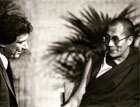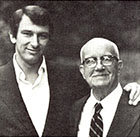
The Hunger Project |
The Hunger Project is an international grassroots organization formed in 1977 by Werner Erhard with the support of John Denver, Dr. Robert W. Fuller and others to generate global awareness and build a consensus to bring about the end of chronic persistent hunger. Today, ending hunger is no longer an obscure issue championed only by a compassionate few. It is now squarely on the global agenda, receiving the attention of leaders and citizens the world over. Praised for its effectiveness by world leaders and authorities on dealing with the persistence of hunger, the United Nations Economic and Social Council roster recognizes the continuing work of the Hunger Project to create the sustainable end of world hunger.
Current Hunger Project News:U.N. Reports 200 Million Fewer Hungry People Than in 1990 (New York Times, May 2015)From a May 2015 United Nations report: In developing regions, the number of hungry people has fallen to 12.9 percent of the population from 23.3 percent of the population 25 years ago. The report described the progress made as a significant achievement. Eastern Region Communities Celebrate Self-reliance Over Hunger All Ghana News, July 27, 2016Some communities in the Eastern Region have organised series of public durbars to celebrate their graduation to self-reliance after aid giver, The Hunger Project (THP), symbolically announced withdrawal of its support. Three epicentres covering about 32 communities were declared “self-reliant” after successfully satisfying the performance criteria set by THP- non-governmental organisation - aiming to stop hunger and mitigate poverty worldwide... The Hunger Project gained deep prominence in local communities due to its interventions that boosted women empowerment, promoted HIV and AIDS and nutrition education. It also affected crop improvement, advocacy and partnership building, microfinance, infrastructural support and establishment of strong democratic principles, enhanced unity and strength among locals.
Related LinksNothing Is So Powerful As An Idea Whose Time Has Come The End of Starvation: Creating An Idea Whose Time Has Come The Hunger Project Source Document The Hunger Project: Empowering Women and Men to End Their Own Hunger Werner Erhard and The Hunger Project Lynne Twist on The Hunger Project Reasons for Optimisim in Today's World - Fareed Zakaria Living Inside of A Context "It Can Be Done" Werner Erhard and The Hunger Project
How the Nonprofit Community Can Stand Up for Itself and Really Change The World: "It was during my first year in college when I began to learn for the first time about the numbers of people dying of hunger. I can still remember the statistics: 15 million human beings dying every year of hunger and hunger-related disease, two-thirds of them children... This was around the time the Hunger Project was launched by Werner Erhard, the creator of the est Training. The project's goal was audacious: to end hunger by the year 2000... The Hunger Project did not meet its goal of ending hunger and starvation within twenty years. But it started the conversation that no one else was having: the conversation that will eventually end hunger in our lifetime...The Hunger Project said Hunger is unacceptable. It's time to talk about eradication. Today, as a result of changing that conversation, we see initiatives like the United Nations' Millenium Development Goals, which call for achieving a series of benchmarks for tackling extreme poverty by 2015. We see Share Our Strength, calling for the end of child hunger in five years; Bono's ONE Campaign calling on us to save 4 million children's lives within five years, and many other similar examples. The Hunger Project transformed our thinking about hunger... Werner Erhard unearthed the notion that a powerful context changes everything." - Dan Pallotta in Charity Case: How the Nonprofit Community Can Stand Up for Itself and Really Change the World.
Living Inside of A Context "It Can Be Done" From an Interview with Catherine Parrish “What The Hunger Project intended to do was to catalyze the global grass-roots committed movement and action that would put the end of persistent hunger into place, which means not just feeding hungry people today, but establishing the whole design, the whole infrastructure so that people can feed themselves and their children well into future generations. You see, it was a project of great faith in human beings. Great faith that if hundreds and thousands and millions of individuals took a stand for the end of the persistence of hunger, as an idea whose time has come, that they would then find an action that was appropriate to them. So if they were an engineer or an agricultural specialist, or if they were a politician, or a United Nations delegate, or if they happened to be a scientist or a professor, or the President of the High School Student Body, all of those individuals would have different actions available to them that would have a different impact. The entirety of the impact would be that child in Uganda being fed on a given day, being inoculated so as to survive disease, and being educated – of great importance to end the persistence of hunger – and that ultimately, we the global citizens of the world would be acting for the benefit of our children. And the necessary actions would take place. So you see it was a stand based on faith and the goodness of humanity, that if human beings knew what they needed to know and lived inside of a context of “it can be done” they would take the actions that were theirs to take that would make that difference. The Hunger Project enrolled over four million individuals who signed a paper saying “I have taken a stand. I will make the end of hunger an idea whose time has come as my personal responsibility.” The Global grass-roots educational campaign went on from 1977 and through the 80’s. Millions of people enrolled and participated and contributed money and there were many, many groups that broke off from The Hunger Project. “Results” was one that did political action in Washington, DC. Another was “World Runners” where people would do marathons to end world hunger, to get out the news, to alert people that something could be done. In those days, that was really rare, and now you see marathons for everything, which is wonderful. Walks to end breast cancer, and marathons for AIDS awareness, and in those days it was really unusual, it was new. And there was enormous participation through the 80’s and then at the end of the 80’s The Hunger Project made a transformation of its own and began to do very high level strategic work, which it’s currently doing in Africa and India primarily. I would say in many ways it was successful all the way to the hungry people, in that millions more dollars were given and raised for organizations that were working on the ground doing relief work as well as for The Hunger Project. The Hunger Project raised hundreds of millions of dollars for other organizations as well. Infant Mortality rates fell in many countries. In some countries, due to war since then, they have again risen. The correlation between war and the infant mortality rate is a direct one. War creates the persistence of hunger and starvation. Also, really tens of thousands, if not more, of people, like me, became lifelong advocates for the end of the persistence of hunger and contribute as volunteers, contribute as donors, contribute as professionals to all kinds of organizations and vehicles and policies to help bring about the end of the persistence of hunger. I think that once one makes a commitment with your heart and soul, I think it takes over your very molecules in a way. It becomes a very part of your personal life’s mission, and then the choices you make will be consistent with that mission. I’ve changed jobs and have participated with projects with many different countries and organizations, all of them consistent with the end of the persistence of hunger, and that will always be the case for me. And I think really for the many thousands of people who made this stand in the 70s and 80s." From an Interview with Catherine Parrish on The Hunger Project and Werner Erhard
Ending hunger: An Idea Whose Time Has Come"Not too long ago, only poets and dreamers imagined a world without hunger and starvation. Today, the worlds expert community--scientists, agricultural specialists, development professionals, working with governments, the United Nations and private voluntary organizations--is united in its declaration that hunger can be eliminated from the face of our planet by the year 2000. Compiled by the Hunger Project--a non-profit group established in 1977--Ending Hunger: An Idea Whose Time Has Come is the definitive source and reference book to one of the greatest opportunities humanity has ever faced--the end of hunger by the end of the century. Written in response to a growing grassroots demand for up-to-date information about world hunger and how to end it, Ending Hunger brings together for the first time in one place the full range of expert thinking and approaches to eradicating humanitys oldest and most persistent enemy. A product of five years research with the essential information, facts and data they need to learn about how they can help to end hunger."
The Hunger Project spawned several other charities to support the effort to end hunger world-wide. World Runners: Through the power of individuals and their decisions to make a difference on this planet, World Runners had a membership of over 8000 individuals who raised over $1.2 million by 1982. Connect with the World Runners Non Profit Organization to find out more about their current activites. Harold Solomon and The Hunger Project World Runners in Soviet Union in 1987 Jeff Bridges co-founded the End Hunger Network 1983 - (which put on the first Live Aid concert) The End Hunger Network now devotes its work to ending hunger in the United States. Charity Case: How the Nonprofit Community Can Stand Up For Itself and Really Change The World, By Dan Pallotta
<< Back to Charitable Organizations ........The Hunger Project Videos>> |
|
In 1988 Werner Erhard was presented the Mahatma Gandhi Humanitarian Award: “In honor of your notable effort to end the starvation and hunger suffered by millions throughout the world and for drawing broad public awareness to the value of integrity in our everyday lives.”
|
||


